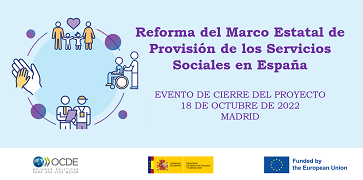Santé

Modernising Social Services in Spain
Designing a New National Framework
Social services in Spain are confronted with a series of challenges, including growing
demand due to population ageing, changing family models, rising inequality and labour
market changes. Services are fragmented and, with multiple providers, lack reliable
and comprehensive data. There is also a discontinuity between primary and specialised
care. The decentralised model of competences generates complexity in management and
financing of services. With the current governance and financing system, there are
disparities in the type and quality of social services provided across the 17 Spanish
Autonomous Communities and two autonomous cities. In addition, there is a lack of
portability of benefits throughout the country. This report suggests ways to improve
the legal context, move towards more universal services, strengthen quality, and move
towards more evidence-based policies.
Published on October 18, 2022
TABLE OF CONTENTS
| Foreword | |
| Abbreviations and acronyms | |
| Executive summary | |
| Overview and recommendations | |
| The complex legal framework for social services across Spain | |
| There are statutory differences in rights to social services across Spain | |
| There are differences in actual access to social services across Spain | |
| Financing, expenses and governance of social services in Spain | |
| A new legal context for social services in Spain | |
| Clarifying the scope of social services in Spain | |
| Measures to improve the quality of social services in Spain | |
| Initiatives to strengthen evidence‑based policy making for social services in Spain |
Powered by OECD iLibrary

 Follow us on Twitter via
Follow us on Twitter via